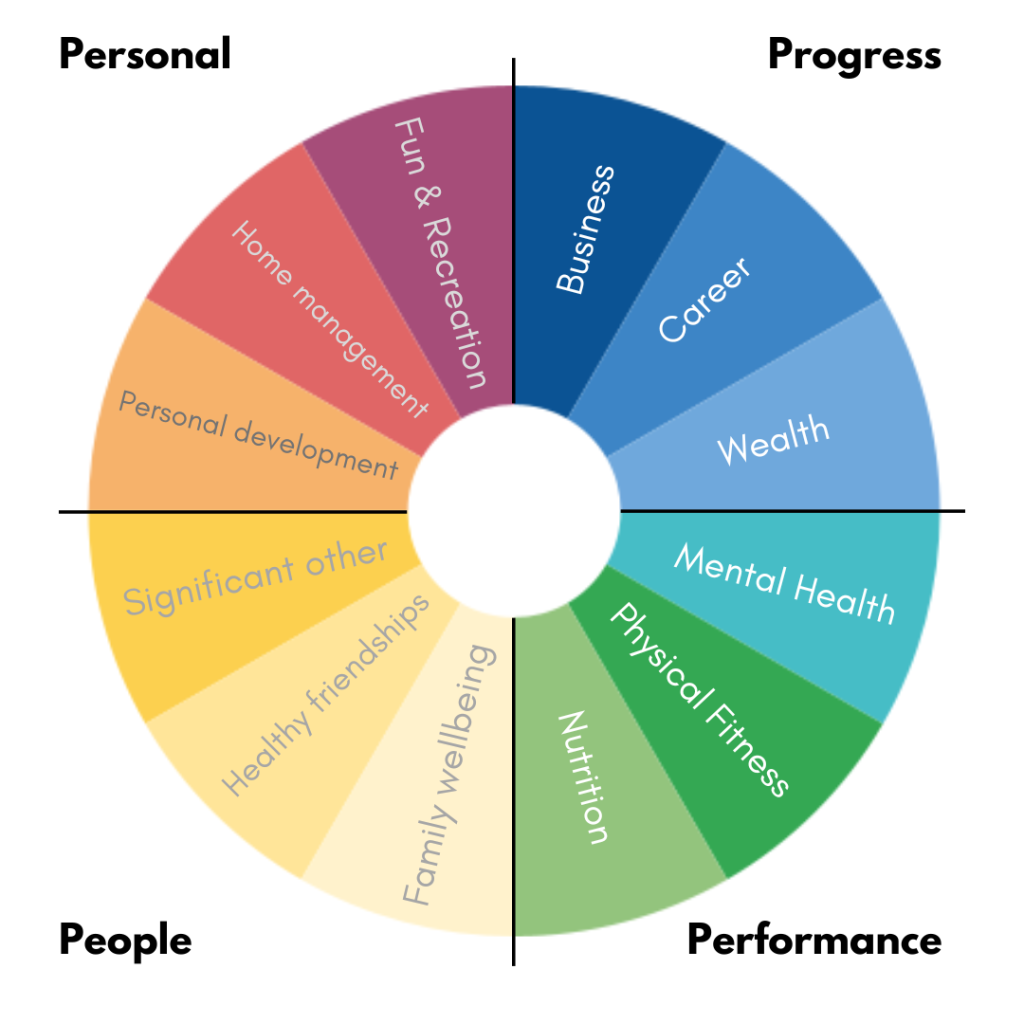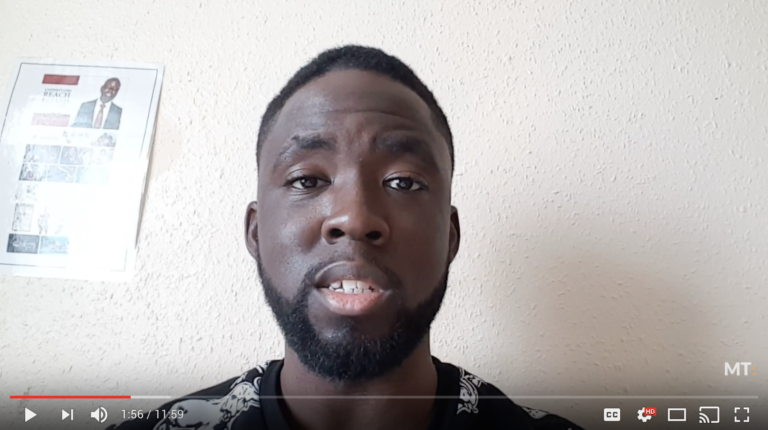The Life Management Formula: The System Your Year Needs.
Life management is crucial for success. It is your ability to direct your activities towards your desired outcomes. This should be done in an aligned and rhythmic way.
It is important to adopt life management because of the heavy distractions in life. Without it, we procrastinate and become inefficient. Developing a system contributes to our wellbeing and productivity.
If we fail to adopt life management, we become the biggest losers. It becomes harder to achieve our goals and our wellbeing is negatively affected. A lack of structure and routine affects our meaning in life (Heintzelman & King, 2018).
“Human beings derive meaning and maintain well-being through the organisation of time.”
– Meyer (1922, p. 6)
Let’s lean into the topic.
Managing your life
There is a process to successful life management. I have broken it down into six components using the CHASER ® method I created. It stands for:
- Choose
- Highlight
- Action plan
- Systemize
- Evaluate
- Repeat
If I am using the CHASER ® method at the beginning of the year, I begin with a method I call ‘Priming.’ This is a process of asking myself questions to get me into a prime state. This could be asking myself:
- What are my lessons learned?
- What are my drivers for success?
- Who do I want to become?
These are but a few examples. It is likely I will develop a separate newsletter on this. You can also try it out straight away via my Life Navigation System template.
Let’s walk through each one.
Choose your focus

Pick the areas in your life that stand out to you the most. You can find examples of the wheel of life to help you do this. I have my own version of this known as the Pillars of Mastery. These are 4 areas broken down into 3 sub-areas. The four areas are:
- Progression
- Business development
- Career development
- Wealth management
- Performance
- Physical fitness
- Mental Health
- Nutrition Management
- People
- Family wellbeing
- Healthy friendships
- Significant other
- Personal
- Personal development
- Home management
- Fun & recreation
I would choose one subarea to focus on. If I wanted to, I would complete this exercise for some or all life areas at the beginning of the year. It’s important to realise that focusing on one however, makes it easier. The area you choose reveals the values surrounding your goals, and the subarea reveals the focus.
Next, rank your current satisfaction in this life area out of 10 (10 being the best and 0 being the worst). This will force you to quantify how well things are going. Once ranked, describe the reasons why you chose a particular number. Additionally, you can include things like barriers to success using the SCHEMES acronym. You can also include success factors using the same process.
Highlight your desired outcomes
Once you have chosen your subarea, you need to highlight your desired outcomes. You are describing what 10 looks like. Paint a picture of:
- Who you are
- What you do
- What you have
- What you feel
Once you have done this, think about the main means value you need to succeed. A means value is a quality you believe is important and required to help you achieve your goal. Think of the quality as a mindset, characteristic, or device used to help you make decisions.
For example, if you chose physical fitness from the performance pillar, your value may be health. Your value could also be thriving, or vitality. If it was business from the progression pillar it could be ambition or wealth. The pillars and subareas will give you clues on the value you want to focus on.
Furthermore, it is important to determine the outputs from these desired outcomes. These are essentially measurable and tangible markers of success. For example, if we are using physical fitness, an output may be losing 10 kg in 12 weeks. If the subarea was business it may be making 4 sales of a £1000 programme every 4 weeks.
To clarify, you are:
- Highlighting your desired outcomes
- Defining the means value for success
- Defining the outputs for success
Develop an action plan

The next step is to put this into some sort of plan. To help you do this, you can cultivate your plan from many different sources:
- Brainstorming
- Generating ideas from others
- Research online
- Utilise a framework from a book, course or programme
- Use an AI tool like ChatGPT
I prefer to work in weeks. It is more manageable. Planning too far ahead makes it difficult. But, you can plan in one of the following ways:
- Week to week
- 12 weeks ahead
- In quarters
I approach planning in the following way:
- Develop a quarterly high level plan for the year. It really isn’t a plan but are milestones I am aiming for in each quarter for the next 12 months. This is more relevant for the beginning of the year.
- Develop a loose 12-week plan. This does not need to be accurate, but it forces me to think about what I need to do step by step. I use SCHEMES to help me out. I also base it around the outputs and how I want to feel at the end of the week.
- I review and iterate my plan, week on week, ensuring that I am on track. This makes my plan relevant.
I usually do this in Notion, and in previous years in Trello or Google Docs. It can also be done in your physical planner.
Create an intelligent system
Here is a definition of a system:
“A system is characterized by the interconnections of its elements, as well as the internal nature of those elements. …It has generative power. It produces effects beyond the modes and functionalities of its elements.”
– Esa Saarinen and Raimo P. Hämäläinen (2007, p. 4)
For the everyday person, a system is a set of principles or procedures used to achieve a goal. It is organising your time and activities around routines. Systems intelligence is the attempt to do this taking into account human behaviour.
The actions before this set you up for the right behavioural cues. To create a solid system you need to think about your activities’ day to day. These affect your behaviours. You also need to think about time and organisation. What can give you the biggest reward for the smallest amount of work?
Typical tools I use to help me create my system are:
- Notion: helps create ultra-organised workflows, SOPs, and databases.
- Google Calendar: acts as an alarm or reminder to do particular activities or events.
- Google Drive: stores and organises my documents
- Accountability buddies: an objective, ambitious, emotionally intelligent and reliable person I meet with regularly to stay on track with my goals. This could also be a coach or mentor
- Motivation: this is generated via YouTube, podcasts, books, courses or insightful conversations.
What makes the system intelligent is iteration. This iteration is based on the results you get week to week, and the ease of use of your system. This is why we review our progress weekly. We will talk more about this in the next bit.
Finally, it is important you develop a way of tracking your metrics. This can easily be done on a spreadsheet that clearly defines successes. I would also accompany this with a comments section to add meaning to the data. Of course, you can also do this in your planner.
Evaluate success towards your desired outcomes

To evaluate is to assess or judge a piece of work(s). It really is a review; yet, evaluations focus on metrics. The key metrics are based on:
- Outputs for the week
- If you have remained loyal to your means values
- How you have felt
Questions will be key to your evaluation process. The same questions asked every week will help you measure how well you are doing. These could be:
- What were my successes?
- What were my challenges?
- How can I improve for next week?
- What do I need to focus on?
Also, the evaluation part focuses on your system. Use this time also to see if there are improvements to your system that can be made. The system will never be perfect as we change all the time.
What makes this evaluation part magical is that it is done on a weekly basis. Some choose to do it bi-weekly or monthly, but for me too much time passes after a week to remember what I am evaluating.
Repeat the process after 12 weeks
The final step is to repeat this process after your 12 weeks. You can either continue with your goal, or choose a new one that is fitting. If you are ambitious enough, maybe you want to introduce another one. I find that sticking to one midterm goal for 3-12 months is doable.
If you smash your goal before the 12 weeks, take a break, simmer on what you want to tackle next, and repeat the process.
This is a solid system for success, and if you follow it, you won’t fail. Even if you don’t hit your goal, you will have clear lessons learned. This process has helped me and is the reason why I have had such a successful last 3 years. Some of these successes include:
- Paying off all my debts
- Quitting my job to become a freelance contractor
- Doubling my income
- Increasing my coaching clientele and helping them create positive results
- Creating and selling my books, courses and programmes
- Buying a new house
These are some of my successes, and I owe it to this process. Hopefully it can help you develop some of these wins too.
Key Lessons
- Choose your focus based on life areas.
- Highlight your desired outcomes and create your goal.
- Develop an action plan based on research, brainstorms and frameworks.
- Create an intelligent system centred around values, routines, tools and organization.
- Evaluate success towards your desired outcomes on a weekly basis.
- Repeat the process after 12 weeks, either adapting the goal or creating a new one.
This newsletter aimed to give an in-depth overview of how you can successfully create life design. This is the method I have used, and it has worked extremely well for me. If you’re stuck, and lost, this will be the method for you.
If you want I can help you in the following 3 ways:
- Secure the Job: A step-by-step course that unveils systems and strategies for getting a new job.
- The Independent Consultant UK: A guide to becoming a contractor in the UK. This is a step-by-step walkthrough of my experiences. It hosts exclusive information to help you transition into the space of contracting.
- Book a call: Let’s have a chat to focus on your life areas and where you can have the biggest impact. If it makes sense, we can progress towards procuring coaching or mentoring.
Build your portfolio career using systems intelligence & positive psychology.
Join other subscribers who get 1 practical tip every Sunday afternoon.
By entering your name and email address you agree to receive content and promotional offers centred around personal and professional development from Michael Tabirade. You can unsubscribe whenever you want to.







